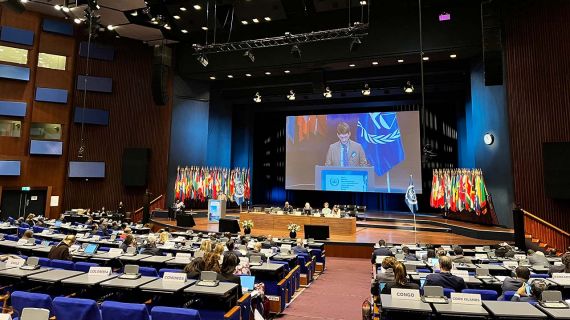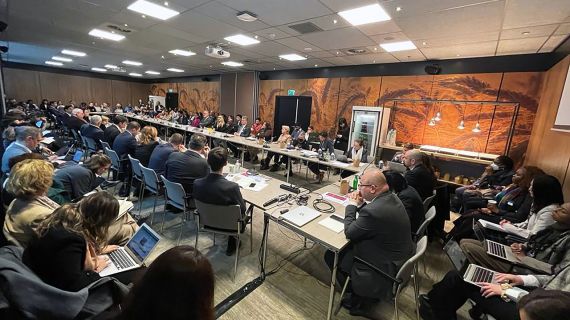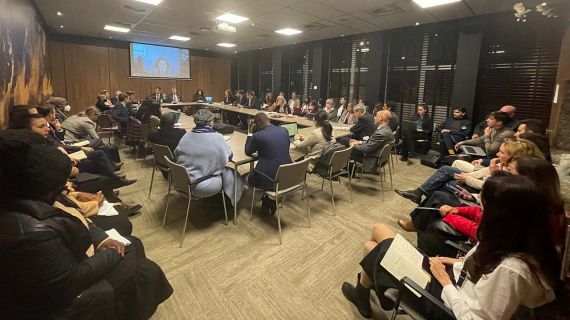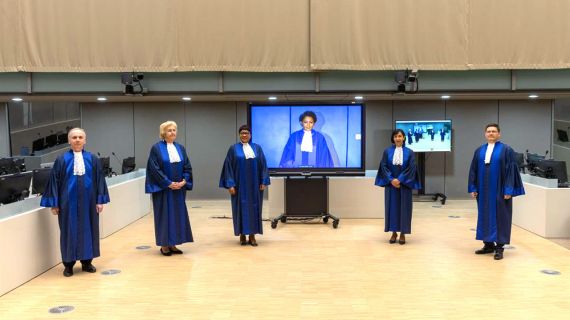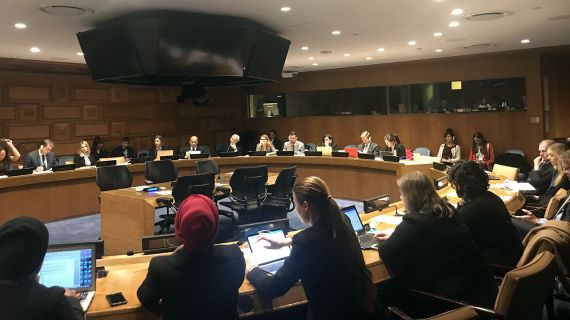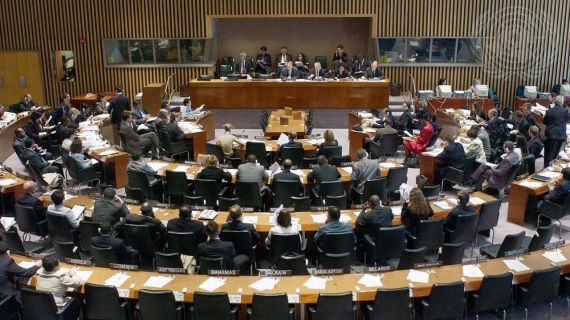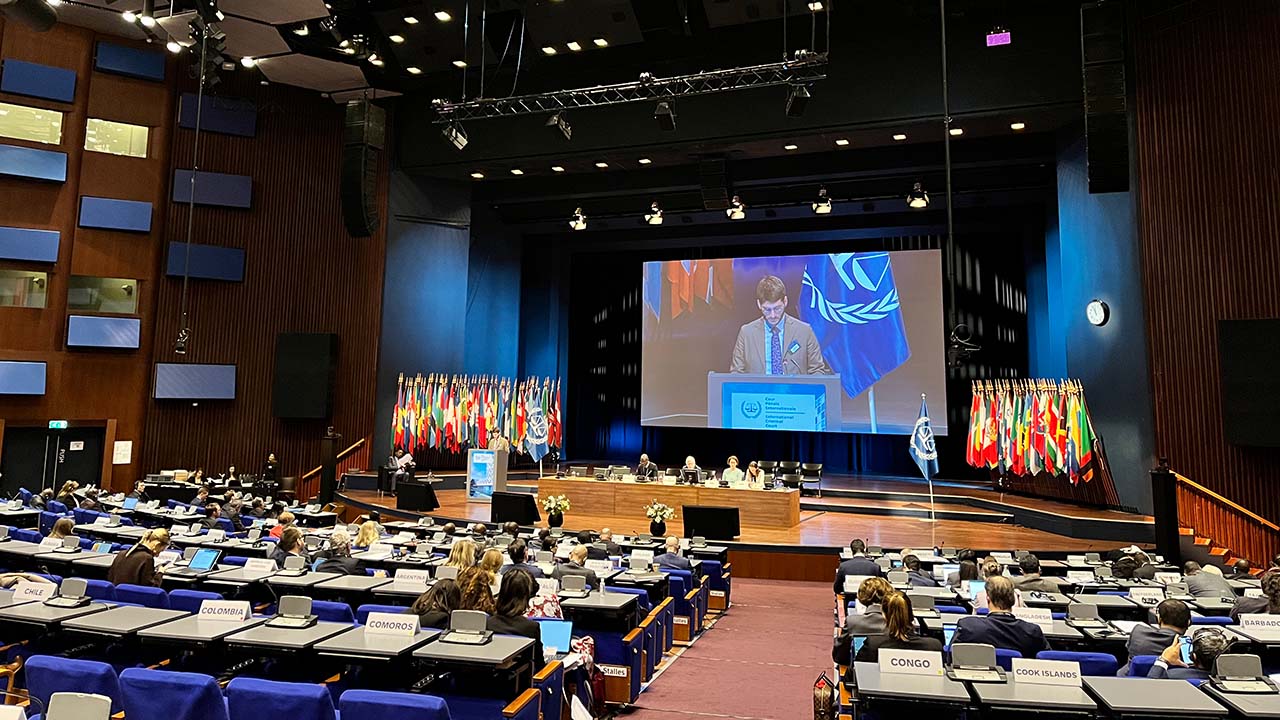
On 5-9 December, Parliamentarians for Global Action (PGA) participated in the 21st session of the Assembly of States Parties (ASP) of the International Criminal Court, which took place in The Hague, the Netherlands. Every year, the ASP (the ICC’s management oversight and legislative body, composed of representatives of the 123 States parties to the Rome Statute) gathers to discuss concrete issues related to the Court’s work, including its budget, its activities, the status of contributions, and audit reports. This 21st session concluded with the adoption of five resolutions.
On this occasion, PGA organized two critical side events on 8 December, which provided concrete reflections on serious issues faced by the Rome Statute system. Both events gathered high-level participation from the sICC and States representatives, as well as other civil society organizations.
The first side event, co-hosted by Belgium, Liechtenstein, the Netherlands, the Republic of Korea, and Switzerland, and co-organized in partnership with Global Rights Compliance, focused on the “Universality of the Rome Statute and its amendments.” Achieving the universality of the Rome Statute and all its amendments to end impunity for international crimes has always been at the center of PGA’s work within the framework of its Campaign for the Rome Statute. In this line, PGA member, Senator Boris Dittrich (the Netherlands), highlighted PGA’s efforts, which allowed for considerable developments throughout the years, including very recently during its 12th Consultative Assembly on the Rule of Law and the ICC (CAP-ICC), where parliamentarians from Guinea Bissau, Jamaica, Ukraine, and Tuvalu, among others, delivered powerful statements and pledged to work towards the ratification of the Rome Statute in their respective countries.
Yet, as raised by the Permanent Representative of the Netherlands to the ICC, H.E. Henk Cor van der Kwast, and Ms. Jiun Kim, Legal Advisor representing the Ambassador of the Republic of Korea to the Netherlands, H.E. Yeondoo Jeong – focal points for the universality and the full implementation of the Rome Statute – even though 123 States parties already joined the Rome Statute system, it is not sufficient to ensure the effectiveness of the Court. As conveyed by Amb. Cor van der Kwast, each ratification increases the legitimacy of the Court and the Rome Statute System, and only with parliamentarians, stakeholders, civil society organizations, and states can we achieve justice and impunity.
Further reflections provided by H.E. William Roelants de Stappers, Permanent Representative of Belgium to the ICC, Mr. Sina Aliva, Senior Advisor at the Permanent Mission of Liechtenstein to the UN, and Ms. Corinne Cicéron Bühler, Director, Directorate of International Law of the Swiss Federal Department of Foreign Affairs, underlined additional concerns relating to the lack of ratification and implementation of the amendments to the Rome Statute on war crimes and crime of aggression. Although the amendments have enabled the modernization of the instrument, the level of ratification and implementation is far too low to combat impunity for these crimes effectively. This is particularly the case for the amendment to article 8 on the intentional use of starvation of civilians in Non-International Armed Conflicts, ratified only by 11 States parties, and for the amendment on the crime of aggression, ratified by 44. Additional efforts, especially from Liechtenstein, have been devoted to promoting the ratification of the crime of aggression while highlighting the key role Parliamentarians can play in this endeavor, including joining and working with PGA
In their interventions, the ICC President, Judge Piotr Hofmański, and the ASP President, Judge Silvia Fernández de Gurmendi, stressed the importance for States to be part of the Rome Statute system and directly participate in the ICC’s oversight. They insisted on the need to promote the political will to overcome the various challenges that may prevent the ratification of the Rome Statute and its amendments and the importance of clarifying the objectives of this instrument and the way the principle of complementarity works.
Dr. Galyna Mykhailiuk, PGA Member and Member of the Verkhovna Rada (Ukraine), stressed that because of the war of aggression against Ukraine, the ratification and implementation of the Rome Statute, as well as the need to prosecute international crimes, has become one of the priorities of the Ukrainian parliament. PGA has been actively assisting Ukrainian legislators in the last decade in achieving these goals, including issuing urgent calls on President Zelensky to sign Law No. 1164-IX and ratify the Rome Statute.
The second side event organized by PGA, “Challenges for the Rome Statute system and the fight against impunity,” aimed to provide reflections on two serious issues affecting the work of the ICC and undermining the global movement in the fight against impunity:
- Amending the amendments on the crime of aggression and addressing the rights of its victims, including combatants who may not be otherwise protected under war crimes and crimes against humanity; and
- Reforming national nomination procedures for ICC judicial candidates so that the ICC can live up to its expectation of rendering justice to victims.
In his introductory remarks, Senator Boris Dittrich (the Netherlands) presented the highlights of the Buenos Aires Plan of Action on the Universality, and Effectiveness and political support for the Rome Statute system against impunity, adopted by Parliamentarians at the 12th CAP-ICC in November 2022, which contains two concrete action points on these issues:
3. Ensure that there is no impunity gap for the crime of aggression with respect to all situations of aggressive war, starting with the ongoing war of aggression in and against Ukraine:
a. To this effect, launch parliamentary actions demanding all Governments of the 123 States Parties to realign the jurisdiction of the ICC on the crime of aggression to the regime of the Rome Statute of 17 July 1998 on genocide, crimes against humanity, and war crimes, hence eliminating the norms contained in paragraphs 4 and 5 of Article 15bis of the Statute that are incompatible with the principle of equality of all individuals before the law;
[…]
8. Vigorously engage with our colleagues from all political affiliations to achieve national and multi-partisan consensus to support the adoption by our competent authorities (e.g., Ministries for Foreign Affairs) of public, transparent, and merit-based procedures at the national level to make nominations for judicial positions at the ICC:
a. To this effect, call upon all States Parties to the Rome Statute to immediately implement Recommendation 377 of the Independent Experts Review report calling States to adopt guidelines or criteria to improve transparency and accountability in domestic nomination processes and meet the deadline of the December 2022 Assembly of States Parties, which is necessary to ensure that the new guidelines apply to the nominations for the six new ICC Judges to be elected in 2023.
Specifically focusing on the rights of victims of the crime of aggression, Dr. Yael Danieli, Founder and Executive Director of the International Center for the Study, Prevention and Treatment of Multigenerational Legacies of Trauma (ICMGLT), provided a detailed explanation of the different categories of trauma, especially on moral injury, that can affect survivors of aggressive wars: conscripts on both sides may also be potential victims of international crimes.
Her intervention was followed by a comprehensive analysis of Professor Claus Kress, Director of the Institute of International Peace and Security Law at the University of Cologne, on the gap in the legal architecture related to the crime of aggression, which became more visible since the Russian Federation military troops invaded the Ukrainian territory on 24 February 2022. In this regard, he formulated three appeals:
- International decision-makers must change their mindset: the crime of aggression has been sidelined for far too long, and there must be accountability to prevent other atrocities.
- States parties should initiate a diplomatic process to amend the Rome Statute so that barriers, which require a selective application of the prosecution of the crime of aggression, will be overcome. On this point, Professor Claus Kress applauded PGA’s proposal to partially align the ICC jurisdictional regime on the crime of aggression to the one already existing for the other three core crimes. Other avenues include entrusting the UN General Assembly with a referral power in case the Security Council would be prevented from acting or envisage a narrower role confined to the course of limited jurisdiction over the crime of aggression.
- There is a need for a more holistic approach. If the crime of aggression is left out of the prosecutions related to the ongoing war in Ukraine, it would not only be to the detriment of Ukraine but to the international community as a whole.
Following his intervention, Dr. Galyna Mykhailiuk provided a bleak picture of the current situation in Ukraine, where the scale of crimes is unprecedented: at this stage, the Ukrainian Prosecutor Office is investigating over 6,000 war crimes and crimes against humanity. While recognizing that domestic prosecutions are and will not be enough, she indicated that Ukraine already engaged with partners worldwide to hold every perpetrator accountable and prosecute the crime of aggression, which, as she emphasized, already started in 2014. Dr. Galyna Mykhailiuk called on the international community to establish a Special Tribunal that would be mandated to prosecute this crime, hold the highest military and political leadership to account, and ensure compensation for victims and survivors of mass atrocity crimes.
Turning to the issue of reforming national nomination procedures for ICC judicial candidates, Ms. Petra Benešová, Legal Officer at the Ministry of Foreign Affairs of the Cech Republic, explained that States parties are not obliged to share their domestic procedures with the ICC, which prevents further transparency of the system. She set the Czech Republic’s national selection procedure example, as the whole process is duly carried out to ensure that the most qualified candidate is selected from the call for applications to be examined by the selection committee. The latter is composed of the Czech judges holding the highest judiciary positions, as well as of representatives of members of the Court of Arbitration to ensure the knowledge of international law.
The side event concluded with comments from Dr. Deborah Ruiz Verduzco, Director of the Coalition for the ICC, who called on stakeholders to endorse an inclusive approach from a gender, social, and geographic perspective. She highlighted that it is only through cooperation and mobilization of various actors that legal obstacles will be solved and situations as well as threats around the world, which have attracted less attention from the international community, will be addressed.
Finally, before the closure of the session of the ASP, PGA’s Secretary-General, Dr. David Donat Cattin, had the honor to deliver a statement on behalf of the Coalition for the ICC (CICC). In the statement, the CICC underscored the importance of the role played by human rights defenders in the Rome Statute system, but who nevertheless continue to face threats because of their work to advance justice. Therefore, calling on States parties to guarantee civil society’s participation in the ASP’s work, the Coalition also stressed the need for the different organs of the Court to continue protecting and defending human rights advocates. Likewise, Members of the Coalition urged States to provide sufficient and sustained resources to support the work of the Court and emphasized the importance of setting a vetting mechanism for all ICC and ASP elections.
The 22nd Session of the ASP will take place next year, on 4-14 December, in New York, USA.
Before the closure of the session of the ASP, PGA’s Secretary-General, Dr. David Donat Cattin, had the honor to deliver a statement on behalf of the Coalition for the ICC (CICC).





